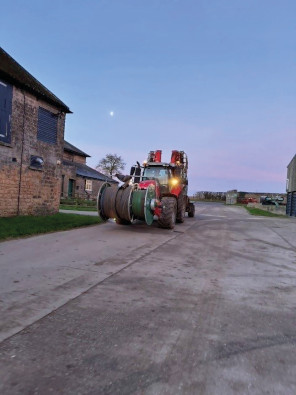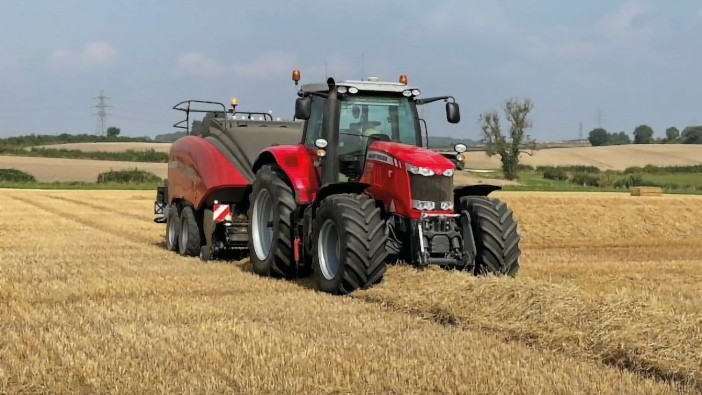For more than 30 years, Martin Hays has offered contracting services to the Derbyshire area. We went and visited the 2024 Contractor of the Year to find out more about the business.
“I haven’t done too badly for someone who didn’t have a farming background.” That’s the modest summation of more than thirty years of contracting and farming from Martin Hays, who took home Contractor of the Year at the National Arable and Grassland Awards in February.
While he didn’t grow up on a farm, he spent his childhood on the periphery in rural Derbyshire. He remembers seeing a local farmer harvesting silage with a Ford 5000 and a Kidd double chop trailed forager in the field at the bottom of the family’s garden. “I just thought it was brilliant, and I started offering to help when I could.”
From that point on, Martin spent his weekends at the farm helping out and learning about agriculture. When he left school, he joined the Youth Training Scheme and went to work with the same farm – something that would last until the dairy quotas were introduced and the farmer decided to sell the herd.
“Bill Wright, who was a local contractor, took me on next and that’s where I got the bug for contracting. I worked for him for eight years until I finally decided to go out on my own.”
In 1990, Martin sold a brand new car to pay for his first tractor – a Case 956 XL – which he hooked up to a Welger 630 conventional baler to work for straw merchants. “That was an incredible tractor,” he said. “I’ve actually looked for it since because I would buy it back in a heartbeat.”
Expanding the operations offered took time. Martin had his Class 1 licence and so drove lorries through the winter months to maintain his income. Working with other businesses in the area, he was able to borrow equipment, like ploughs, to offer seedbed preparation. “I was always mechanically minded, so if I needed a machine, I would look at second-hand kit – often kit that wasn’t running – and would fix it up myself.”

This practical approach came from necessity. Adding an operation to the business requires careful consideration due to the level of competition in the area. Martin noted that while you can have conversations with customers might help to guide investment, you can’t guarantee that work until the machine is in the yard. By limiting the capital investment where possible, Martin has been able to test the market for different operations with minimal risk.
Not that he is risk-averse. If there is a clear opportunity, he will take it. In 1996, he attended a Platts Harris demonstration day, where they showed an umbilical slurry system. Martin that more people were looking at umbilical applications. “There was also another contractor who was interested; however, they had already invested heavily that year in forage equipment so it was the perfect opportunity.”
The setup cost £25,000, at the time one of the most significant investments Martin had made. However, the wet weather that followed in the winter meant that demand increased substantially, and Martin was out working every day. “It paid for itself within that first year, and umbilical spreading became our bread and butter for a long time.”
Adjusting work
Martin explained that while he had previously chased work, looking to fill every possible hour in the day, he takes a different approach now. “During harvest, if we got rained off, I wouldn’t send the workers home, I would get them started on the next tasks,” he said. “I’d have good staff and would just work them constantly, which meant they looked for other opportunities.”
Now he has limited the area in which the business operates, creating a triangle from Buxton to Alfreton and down to the A52. “It still looks like a big area but with the speed of equipment nowadays, it’s more than manageable. While farming will always have its busy periods that require long hours, I now make sure that the staff, and myself, get a better balance of family time.”
He has also created a niche for the business by investing in technology, which has helped increase efficiency for small farms in the area. This includes variable rate applications and section control for mainline bits of machinery, as well as GPS systems across the tractor fleet.
“A lot of our customers are small, family farms who could not justify the high price of entry for these systems, but who want to do their bit to improve efficiencies and be more environmentally friendly, especially as the new Sustainable Farming Incentive (SFI) expands,” Martin explained.
This investment has been done with the same careful consideration that Martin used to introduce new operations to the business. Where possible, grants have been used to help with the initial cost, nor has he been afraid to search out cheaper options – for retrofit systems such as mirror-mounted crop sensors. “The biggest part of making money is knowing where you can save it,” he explained.
Baling now makes up the biggest part of the workload, with New Holland four-string and Case six-string large square balers following a mixed fleet of grassland kit, as well as handling straw after the Claas Lexion combine. Round baling was dropped from the business when more customers moved to square baling.
“There was a time when I would have been worried about dropping an operation because I believed it would allow other contractors to get their foot in the door. Now we’re much more open to working with other businesses,” he said. “It takes pressure off of us, saves investment in machines that cannot be justified with the workload, and builds relationships with contractors who can help us, and ask us for help.”

A good amount of spraying is also done, with a Househam AirRide self-propelled machine, as well as muckspreading, cultivation work and excavation work on both farmyard and commercial projects, which sees the company through the winter months. The workload is handled by Martin, his son Daniel, who heads up the baling contracting, and one full time employee, with sub-contracting agreements and part-time operators utilised at peak times.
A view to the future
Martin believes that contractors will be needed more and more as growers figure out how to continue farming while also maximising income from environmental schemes within the SFI. This is coupled with rising machinery costs, which are difficult to justify without a significant workload. He sees this from both sides, as alongside the contracting business, he runs a mixed farm that totals 450 acres of owned and rented land, with a 110-head herd of Aberdeen Angus cattle.
“It’s tricky sometimes to balance our work with the contracting, but we have to be strict with ourselves,” he said. “There are times when the weather is against and the crops at home are going to harvest at a high moisture level because we have a commitment to our customers, but that’s how it is. We make a plan, do our best to stick to it, and communicate clearly when we are going to be at each farm.”
He’s currently looking at different drill options which could help establish grass leys and cover crops for those interested in SFI and has seen slurry applications increase significantly as farmers understand the potential savings in artificial fertilisers, as well as try to fall in line with the slurry storage and application rules that will be brought into force over the coming years.
Keeping the business running and ensuring it meets the necessary regulations has been supported by the National Association of Agricultural Contractors (NAAC), an organisation in which Martin himself has had a major role, being on the board and taking the role of chairman between 2016 and 2018.
“We joined in 2000 when Foot and Mouth was making moving between counties and farms incredibly difficult. Jill (Hewitt, chief executive, NAAC) helped us put together terms and conditions, which made it clear to farmers outside of our area that we would not risk bringing the disease to local farms. It gave us the confidence to start earning again.

“Since then, it’s been an invaluable resource. The health and safety documentation alone has helped us stay within the law and has come included with the membership costs – far below what a bespoke inspection and policy would have cost us.”
Are you the next Contractor of the Year, or do you know someone who could be? You can register your interest for the 2025 National Arable and Grassland Awards now. Go to www.natonalarableandgrasslandawards.co.uk


